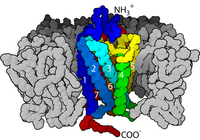
Photo from wikipedia
Chimeric Antigen Receptor T-cell (CART) immunotherapy led to unprecedented responses in patients with refractory/relapsed B-cell non-Hodgkin lymphoma (NHL); nevertheless, two-thirds of patients fail this treatment. Resistance to apoptosis is a… Click to show full abstract
Chimeric Antigen Receptor T-cell (CART) immunotherapy led to unprecedented responses in patients with refractory/relapsed B-cell non-Hodgkin lymphoma (NHL); nevertheless, two-thirds of patients fail this treatment. Resistance to apoptosis is a key feature of cancer cells that associates with treatment failure. In 87 NHL patients treated with anti-CD19 CART, we found that chromosomal alteration of BCL-2, a critical anti-apoptotic regulator, in lymphoma cells was associated with reduced survival. Therefore, we combined CART19 with the FDA-approved BCL-2-inhibitor, venetoclax, and demonstrated in vivo synergy in venetoclax-sensitive NHL. However, higher venetoclax doses for venetoclax-resistant lymphomas resulted in CART toxicity. To overcome this limitation, we developed venetoclax-resistant CART by overexpressing mutated BCL-2(F104L) which is not recognized by venetoclax. Notably, BCL-2(F104L)-CART19 synergized with venetoclax in multiple lymphoma xenograft models. Furthermore, we uncovered that BCL-2 overexpression in T cells per se enhanced CART anti-tumor activity in preclinical models and in patients by prolonging CART persistence.
Journal Title: Cancer discovery
Year Published: 2022
Link to full text (if available)
Share on Social Media: Sign Up to like & get
recommendations!